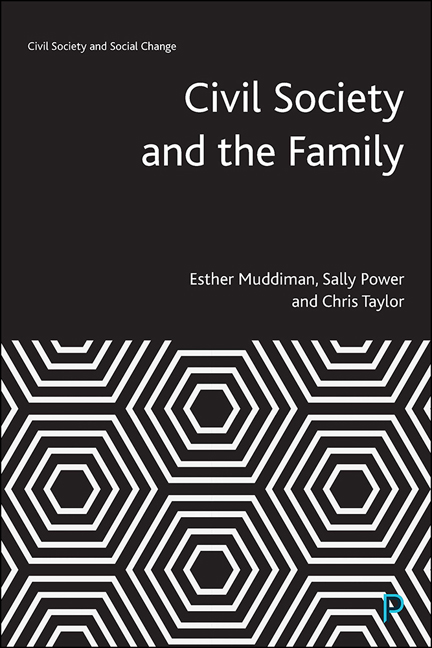Book contents
- Frontmatter
- Contents
- Tables
- Figures
- Notes on the Authors
- Acknowledgements
- 1 Starting Points
- 2 The Paradoxical Positioning of the Family and Civil Society
- 3 The Challenges of Researching the ‘Private Sphere’ of the Family
- 4 The Uncertain Business of Raising Citizens
- 5 Keeping the Faith? Secularisation, the Family and Civic Engagement
- 6 Mothers, Grandmothers and Civic Engagement
- 7 Family Arguments: Finding one’s Voice
- 8 Politicising Family Food Practices
- 9 The Upward Transmission of Civic ‘Virtues’
- 10 Reframing Civil Society and the Family
- References
- Index
6 - Mothers, Grandmothers and Civic Engagement
Published online by Cambridge University Press: 18 March 2021
- Frontmatter
- Contents
- Tables
- Figures
- Notes on the Authors
- Acknowledgements
- 1 Starting Points
- 2 The Paradoxical Positioning of the Family and Civil Society
- 3 The Challenges of Researching the ‘Private Sphere’ of the Family
- 4 The Uncertain Business of Raising Citizens
- 5 Keeping the Faith? Secularisation, the Family and Civic Engagement
- 6 Mothers, Grandmothers and Civic Engagement
- 7 Family Arguments: Finding one’s Voice
- 8 Politicising Family Food Practices
- 9 The Upward Transmission of Civic ‘Virtues’
- 10 Reframing Civil Society and the Family
- References
- Index
Summary
Introduction
Drawing on the feminist debates outlined in Chapter 2, here, we use our young participants’ survey data about family relationships and the accounts of their parents and grandparents to explore the distinct character of female family roles and relationships, and how they inform and are informed by civic values. While a significant body of political science scholarship foregrounds the role of fathers in passing down particular political traits and values to their children, our research indicates that female family members are engaged in various civically minded activities, and that it is mothers and grandmothers who play a central role in sharing civic and pro-social values with younger generations.
The role of women in the home has been well researched, as is their tendency to carry out the majority of childcare and eldercare. Researchers have also identified gendered patterns of civic engagement. Our focus here is on women as mothers, sisters, daughters, aunts, cousins, nieces and grandmothers. Our survey data indicate that among the 13–14 year olds in our study, girls are more likely than boys to be civically engaged. Our analysis also shows that young people's relationships with their mothers and (predominantly female) grandparents are important in predicting whether or not they are likely to be civically active themselves.
Exploring female familial roles helps us to highlight the particular ways in which feminine roles and relationships are constructed in relation to civic values, and how practices of mothering, in particular, share some of the characteristics of other civic values. This is not to say that male family members are not influential, but rather that there is something about the character of female family relationships and how they link with civic engagement that warrants closer attention. The chapter concludes by considering the ways in which family relationships are linked to civic participation, lending support to the notion that one cannot bracket private interests out when discussing the public sphere (Fraser, 1997).
Being there: the continued legacy of female homemakers
Female family members have historically spent less time in paid employment than men, and more time with their children or grandchildren. Home has historically been considered a ‘women's place’, and women are traditionally regarded as ‘the focal point of family relationships’ (Allen and Crow, 1989: 2).
- Type
- Chapter
- Information
- Civil Society and the Family , pp. 99 - 124Publisher: Bristol University PressPrint publication year: 2020



